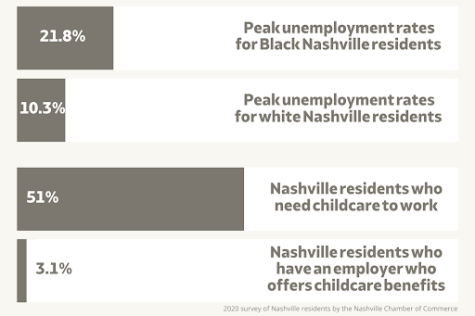In November 2021, NashvilleHealth, a healthcare nonprofit founded by Senator Bill Frist, and its partners published a first-of-its-kind review of the city’s ongoing COVID-19 response. The report, titled “Strategies for Future Preparedness: Impact of COVID-19 in Nashville,” details five areas of community response and provides 28 short, medium and long-term recommendations for future public health emergencies.
The review was spearheaded by a steering committee composed of local government, the business community, scientists, health experts and other community stakeholders. Former Nashville Mayor Bill Purcell was the chairman of the steering committee.
The authors of the report pointed to inconsistencies in national, state and local pandemic response as a challenge.
“Tennessee happens to be a very red state and therefore our political leaders tend to shy away from anything that would infringe on the liberties of Tennesseans,” Tennessee Senator Bill Frist said in his “A Second Opinion” podcast on Nov. 30. “Then you had a local community that was much more aggressive and effective than at the state level and the federal level, which was chaotic.”
Dr. Leana Wen, a senior advisor at Avalere Health and an author of the report, said that the political dynamics of Nashville and Tennessee are evident in other jurisdictions across the country as well, and expressed concern about their effects on public health.
“Coming into this next phase, one of my fears is that public health has become even more politicized,” Wen said. “There is a divide now, across the country, of communities that really respect and value public health versus public health being in the middle of culture wars and ideological debates.”
Purcell went a step further, adding that Vanderbilt’s campus serves as another level of pandemic response.
“Vanderbilt is still, I believe, certainly one of the safest places in the city of Nashville, and perhaps one of the safest in the United States,” Purcell said.
Vanderbilt leaders also reviewed COVID-19 response on campus in the past few months, culminating in a book titled “A Year Like No Other: How a Global Pandemic Led to Vanderbilt University’s Proudest Moment.” While it was not mentioned in the report, the book was written by Ryan Underwood, Vanderbilt’s director of editorial strategy, with a forward from Chancellor Daniel Diermeier.
The NashvilleHealth report applauds Nashville’s public-private partnerships and “clear” crisis communication. In addition to continuing these practices, it also recommends changes to its response, including investments in public health infrastructure, elevating vulnerable populations, standardizing data, elevating minority faith leaders as trusted communicators and creating online dashboards for residents to access vaccinations and other services.
The report highlights gender and race inequities in Nashville throughout the pandemic. Per a 2020 survey of Nashville residents by the Nashville Chamber of Commerce, unemployment rates among Black Nashville residents peaked at 21.8% during the pandemic, double that of white residents (10.3%). Women were also found to make up a disproportionate amount of pandemic job losses in Nashville. Moreover, the report pointed to access to childcare as one of the causes of pandemic unemployment. While nearly 51% of respondents reported that childcare is a condition for them being able to work during the pandemic, only 3.1% said their employer offers childcare benefits.

A major emphasis of the report is the importance of strong, science-driven leadership during crisis response. The report cited a VUMC analysis, which found that Tennessee counties that instituted mask mandates in the summer of 2020 had substantially lower COVID-19 death rates compared to counties without mask mandates, as evidence.
“My concern is that we are behaving as if the pandemic is over, and it’s not. We’ve just started a fifth wave in our country, and you’ve got leaders making decisions that are giving the virus the upper hand,” Dr. James Hildreth, president of Meharry Medical College and a co-author of the report, said in the Nov. 30 interview. “Leaders who are not guided by science can do harm and cost lives.”
Published in the midst of the pandemic, the report is unique due to its early, rather than post-pandemic, evaluation of public health responses. It covers public health policies, economic changes and vaccine rollouts, among others.
“Often, we in the emergency medicine space do after-action reports,” Wen said in the Nov. 30 interview. “But, if you wait until the pandemic is over—whatever that means—then there isn’t the option to course correct.”
The report does not only address governmental response to the COVID-19 crisis. Equally important, it claims, are the efforts by community spokespeople, businesses and disproportionately impacted residents.
“This particular report is unique across the country in the sense that it is not a government report from a mayor or city council, it is a collaborative effort bringing together stakeholders from the non-profit, from the for-profit, the academic, the faith, vulnerable populations and all these communities,” Frist said on his podcast episode about the report.
To center these communities, the report advises upon the importance of having trusted community leaders who can serve as effective spokespeople for pandemic policy. As a former mayor of Nashville, Purcell had often dealt with the challenges of communicating public health policy effectively to different communities in the city.
“Whether it’s access to testing sites, access to vaccines, access to financial resources, people can and should receive that information in their languages through trusted communicators, and have the access that they need,” Purcell said. “Going forward, my hope is that we’re prepared to say that out loud and not forget.”
As the omicron variant and a rise in cases raise new challenges, Purcell said he hopes that the report can serve as a starting point for better responses to public health crises in the future.
“What we’ve learned, as of now, is the likelihood that this pandemic becomes endemic,” Purcell said. “My hope is that this is not a report that stands as the end of the work, but is the beginning of an ongoing work in response to the pandemic, but also in the field of public health. As we go forward, I hope Nashville continuously updates, both the data and the recommendations, so that we’re moving in real time to respond to whatever challenges we have.”
The authors of the report intend the findings to serve as a guide and model for other cities, states and communities.
“I have every confidence that this city, states and this nation are going to continue to look at this [report] throughout the course of the pandemic and ultimately in the years ahead,” Purcell said.









